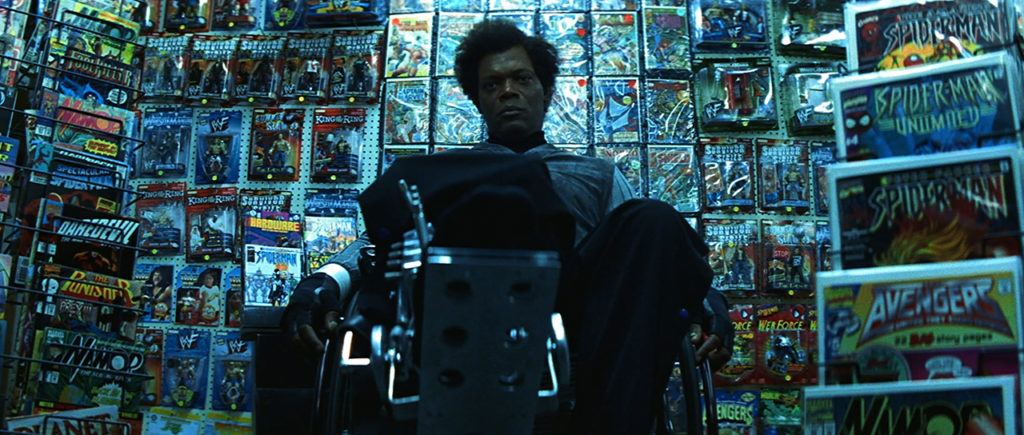
When blue-collar security guard David Dunn ends up the sole survivor of a devastating train wreck, the people of Philadelphia marvel at his luck. Not Elijah Price. The embittered, frail-boned comic book expert is convinced that luck had nothing to do with David’s survival, and hounds the seemingly unbreakable human being with talk of a higher destiny. Why was David spared? Could he be some kind of post-modern superhero? Elijah thinks so. And no one wants to believe that more than David’s 12-year-old son, Joseph. This supernatural identity crisis arrives just as David and his wife, Audrey, are beginning to resuscitate their strained marriage. But can anything endure the revelation yet to come?
positive elements: Elijah’s extreme fragility (he has a rare disorder that causes his bones to break like glass) elicits sympathy, not only for him, but for others with disabilities. As a frightened boy prone to injury, a young Elijah is drawn out of seclusion by his generous and loving mother. On the train, an attractive married woman uncomfortable with David’s subtly intrusive conversation moves to another seat. Despite this brief flirtation with infidelity (he slips off his wedding band when the girl sits down), David is a faithful husband and father willing to work through marital problems. Audrey is equally eager to return their relationship to what it once was. Joseph worships his dad, strives to be a healing force in the family and adheres to “the hero’s code” of keeping bad things from happening to good people by sticking up for weaker classmates. David displays heroics on several occasions, but none more significant than the personal sacrifice he made in order to court Audrey years earlier. When challenged to assist a family in trouble, David puts himself at risk to act upon his newfound calling. Although a twisted character’s behavior implies that ends justify the means—even if that includes killing hundreds of people in the process—the film ultimately vilifies that notion.
spiritual content: Following the train crash, a mass funeral finds a Catholic priest reciting the names of the victims, following each with the after-the-fact intercession, “We pray for your soul.” Mrs. Price encourages her cloistered son that he might as well get out of the apartment once in a while because he could just as easily fall and break a bone walking between the chair and the TV if God wanted it that way.
sexual content: One of David’s premonitions involves a man preparing to take advantage of his date, who has passed out. A comic book store clerk makes a crass reference to masturbation.
violent content: Elijah takes a nasty spill down a flight of stairs, leaving him wheelchair bound. To prove that his father is indeed superhuman, Joseph loads his dad’s revolver and points it at him until David and Audrey convince him to put it down (there’s no hatred involved, just a desperate yearning to show how special his father really is). There are references to violent accidents, a serious car crash and acts of terrorism. A series of mental flashes include a brief shot of a drive-by assault with a bottle. Audrey expresses disdain for the game of football because, as a physical therapist, its violent nature runs counter to her attempts to heal people’s injuries. [Spoiler Warning] A madman invades a suburban home, murders a couple (implied) and holds the teenage daughters captive, chained to a pipe until David frees them. The killer throws David from a balcony. A man barely escapes drowning.
crude or profane language: A mere seven profanities, though four are misuses of the Lord’s name.
drug and alcohol content: None, though David frisks a man suspected of dealing drugs (Shyamalan in a Hitchcockian cameo).
conclusion: This new psychological thriller from the creator of The Sixth Sense (which also starred Willis) leaves a similar, if less indelible impression. Weird stuff happens. And just when you think you know where it’s going, it turns your assumptions on their head. But while Unbreakable is cut from the same bizarre cloth as Shyamalan’s Oscar-nominated predecessor, it’s not as ominously creepy or theologically unsettling—the two biggest problems with The Sixth Sense. That’s refreshing. Also, David’s transcendental “gift” turns out to be remarkably similar to the one central to Stephen King’s darker and more tragic The Dead Zone, but Shyamalan does King one better by displaying a noble optimism. Instead of destroying his “afflicted” hero, he liberates him.
If Unbreakable has a weakness, it’s that the pace feels numb and tired. Stretches of it trudge along as if on Nyquil. But an intriguingly far out premise—that comic book heroes may not be gross exaggerations as much as historical hints at superhuman potential—taps into every viewer’s inner desire to escape mediocrity and aspire to a higher calling. To find happiness and contentment by fulfilling their purpose in life. For the Christian, it means finding God’s perfect will and pursuing it passionately. Sure, this movie is sheer suspend-your-disbelief fantasy. But the point is there for those willing to extract it. The film also makes itself easy to root for by featuring a dad who’s a hero to his son and by promoting the idea that working through marital woes is the way to true healing. A few cracks perhaps (not to mention plot holes), but Unbreakable has honorable intentions and gives mature viewers a lot to think about.